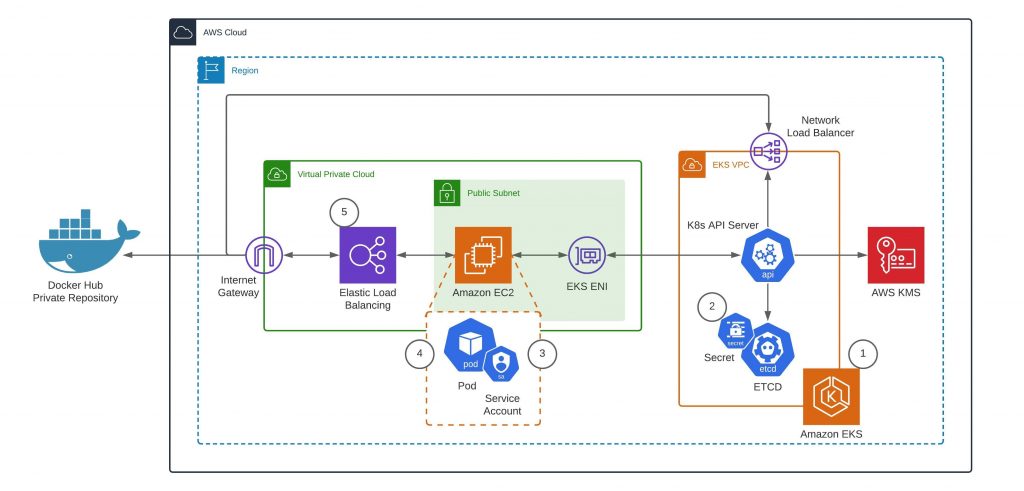Containers
Tag: Amazon ECS
Managing compute for Amazon ECS clusters with capacity providers.
Customers running containers are often challenged with having to manage and understand how to run and scale the compute for their clusters. For customers taking advantage of Amazon Elastic Container Service (Amazon ECS) on AWS Fargate, the burden is lifted as the underlying compute layer is fully managed by AWS, enabling the customer to focus […]
Autoscaling Amazon ECS services based on custom CloudWatch and Prometheus metrics
Introduction Horizontal scalability is a critical aspect of cloud native applications. Microservices deployed to Amazon ECS leverage the Application Auto Scaling service to automatically scale based on observed metrics data. Amazon ECS measures service utilization based on CPU and memory resources consumed by the tasks that belong to a service and publishes CloudWatch metrics, namely, […]
Klook Case Study
About Klook: Klook, a world-leading travel activities and services booking platform, empowers travelers to discover and book on-demand local attractions, tours, transportation, food and exclusive experiences in more than 350 destinations around the world. More than 30 million people in over 180 markets use Klook’s website and award-winning app every month. Klook platforms support 41 […]
New look for Amazon ECS in the AWS Management Console
Recently we launched a new look and experience for Amazon ECS in the AWS Management Console. Since its launch in 2014, Amazon Elastic Container Service (Amazon ECS) has served as a simple way for customers to run production grade container workloads on AWS. Customers such as Disney+, Vanguard, Okta, Fidelity, and UbiSoft trust Amazon ECS […]
Using Windows Authentication with Linux Containers on Amazon ECS
This post shows how to configure a Linux container running on Amazon Elastic Container Service (Amazon ECS) to connect to a SQL Server database using Windows (or Integrated) Authentication. Windows Authentication is the recommended mechanism to connect to SQL Server databases, but using it can be challenging when running containerized workloads.
Authenticating with Docker Hub for AWS Container Services
Docker Hub has recently updated its terms of service to introduce rate limits for container image pulls. While these limits don’t apply to accounts under a Pro or Team plan, anonymous users are limited to 100 pulls per 6 hours per IP address, and authenticated free accounts are limited to 200 pulls per 6 hours. […]
Latest updates to AWS Fargate for Amazon ECS
Recently, we announced features to improve the configuration and metric gathering experience of your tasks deployed via AWS Fargate for Amazon ECS. Based off of customer feedback, we added the following features: Environment file support Deeper integration with AWS Secrets Manager using secret versions and JSON keys More granular network metrics, as well as additional […]
Announcing Amazon ECS deployment circuit breaker
Today, we announced the Amazon ECS deployment circuit breaker for EC2 and Fargate compute types. With this feature, Amazon ECS customers can now automatically roll back unhealthy service deployments without the need for manual intervention. This empowers customers to quickly discover failed deployments, while not having to worry about resources being consumed for failing tasks, […]
Integrating cross VPC ECS cluster for enhanced security with AWS App Mesh
NOTICE: October 04, 2024 – This post no longer reflects the best guidance for configuring a service mesh with Amazon ECS and its examples no longer work as shown. Please refer to newer content on Amazon ECS Service Connect. ——– Customers often have applications owned by different teams in different Amazon ECS clusters. Alternatively, they […]
Announcing the General Availability of Amazon ECS Service Extensions for AWS CDK
NOTICE: October 04, 2024 – This post no longer reflects the best guidance for configuring a service mesh with Amazon ECS and its examples no longer work as shown. Please refer to newer content on Amazon ECS Service Connect. ——– In late 2018, we first shared an introduction to using AWS Cloud Development Kit with […]








